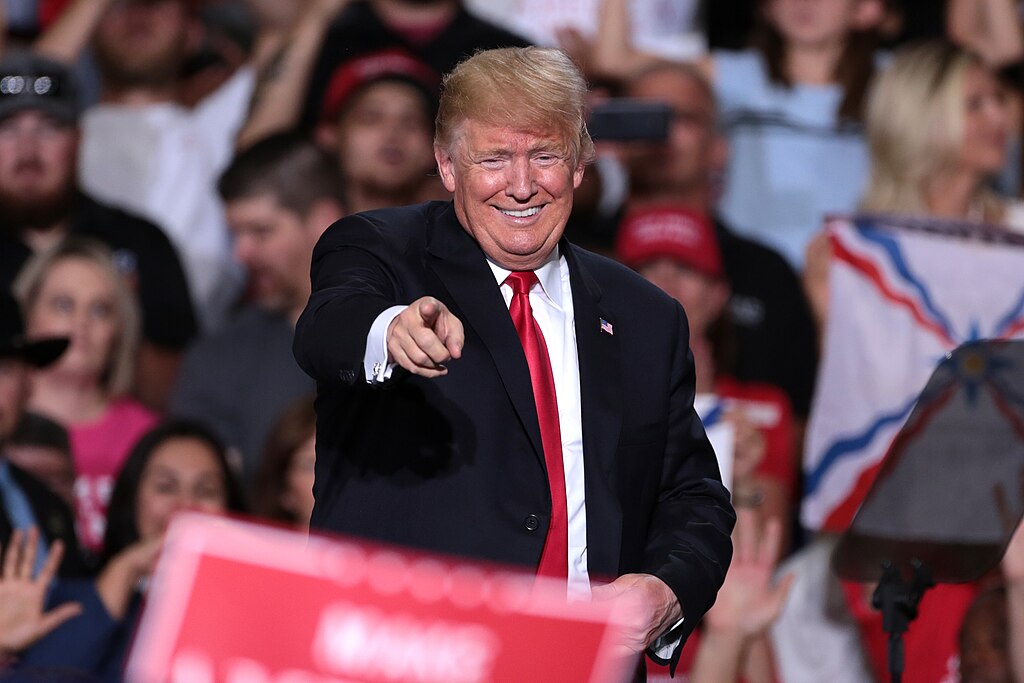According to data from Polymarket, a leading decentralized prediction platform, former President Donald Trump is leading Vice President Kamala Harris by a notable margin, with odds showing Trump at 61% and Harris trailing at 39%. This significant lead has sparked discussions across social media, with political analysts and pundits weighing in on what these odds mean for the 2024 presidential race. Polymarket’s prediction platform, known for providing real-time betting insights, has become an influential indicator of public sentiment, especially as voters and investors closely follow election developments.
Polymarket’s odds, which currently favor Trump with a 22-point lead, are based on bets made by users who anticipate likely election outcomes. The decentralized nature of the platform allows users to wager on events based on perceived probabilities, offering a unique and often revealing snapshot of current sentiment. As of today, Trump’s 61% lead has captured attention and further fueled speculation that the former president could be positioned for a strong return to the White House.
“Polymarket’s odds reflect real-time predictions from people who are betting on the outcome, which makes it a compelling indicator of where public sentiment lies,” explained Dr. Laura Chen, a political scientist specializing in data-driven political analysis. “While it’s not a poll, these figures give us an insight into how voters and investors feel about each candidate’s chances, particularly in battleground states where the margins are tighter.”
Trump’s advantage on Polymarket has quickly become a talking point among supporters, with many taking to social media to celebrate what they view as a validation of Trump’s campaign strategy and voter appeal. “People are betting on Trump because they know he’s the one who can turn things around,” tweeted one supporter, adding that the odds align with recent campaign rally turnouts. Conversely, Harris supporters argue that prediction markets are not always reliable indicators, noting that actual voter turnout and results can differ significantly from online betting trends.
Analysts caution that while Polymarket’s odds are intriguing, they are not foolproof predictors of election results. “It’s important to remember that betting odds don’t necessarily translate into votes,” said Dr. Michael Lin, an expert in political betting markets. “There’s a difference between who people think will win and who actually shows up to vote. Markets like Polymarket capture a sentiment, but they don’t account for factors like voter mobilization, last-minute campaign strategies, and ground-level efforts.”
Critics have raised concerns about the influence of prediction platforms like Polymarket, questioning whether they affect voter perception by creating an impression of a leading candidate. Some argue that such markets could discourage voter turnout among those who see their preferred candidate trailing. However, Polymarket representatives maintain that the platform’s purpose is purely informational, reflecting public sentiment without attempting to sway it.
As Election Day draws near, the significant lead displayed by Trump on Polymarket has added a new dimension to the race. Whether these odds will be borne out by actual votes remains to be seen, but for now, the 22-point margin has sparked discussions and intensified focus on Trump’s campaign momentum.



 Trump Says U.S. Attacks on Iran Will Continue, Warns of More American Casualties
Trump Says U.S. Attacks on Iran Will Continue, Warns of More American Casualties  U.S. Deploys Tomahawks, B-2 Bombers, F-35 Jets and AI Tools in Operation Epic Fury Against Iran
U.S. Deploys Tomahawks, B-2 Bombers, F-35 Jets and AI Tools in Operation Epic Fury Against Iran  Trump Says U.S. Combat Operations in Iran Will Continue Until Objectives Are Met
Trump Says U.S. Combat Operations in Iran Will Continue Until Objectives Are Met  Does international law still matter? The strike on the girls’ school in Iran shows why we need it
Does international law still matter? The strike on the girls’ school in Iran shows why we need it  Why did Iran bomb Dubai? A Middle East expert explains the regional alliances at play
Why did Iran bomb Dubai? A Middle East expert explains the regional alliances at play  Trump’s Iran Strikes Spark War Powers Clash in Congress
Trump’s Iran Strikes Spark War Powers Clash in Congress  Zelenskiy Urges Change in Iran After U.S. and Israeli Strikes, Cites Drone Support for Russia
Zelenskiy Urges Change in Iran After U.S. and Israeli Strikes, Cites Drone Support for Russia  Rubio Says U.S. Would Not Target School After Deadly Iran Strike Reports
Rubio Says U.S. Would Not Target School After Deadly Iran Strike Reports  Marco Rubio to Brief Congress After U.S.-Israeli Strikes on Iran
Marco Rubio to Brief Congress After U.S.-Israeli Strikes on Iran  Suspected Drone Strike Hits RAF Akrotiri Base in Cyprus, Causing Limited Damage
Suspected Drone Strike Hits RAF Akrotiri Base in Cyprus, Causing Limited Damage  Supreme Court Backs GOP Lawmaker in New York Redistricting Fight Ahead of Midterms
Supreme Court Backs GOP Lawmaker in New York Redistricting Fight Ahead of Midterms  Pentagon Downplays ‘Endless War’ Fears After U.S. Strikes on Iran Escalate Conflict
Pentagon Downplays ‘Endless War’ Fears After U.S. Strikes on Iran Escalate Conflict  Trump Launches Operation Epic Fury: U.S. Strikes on Iran Mark High-Risk Shift in Middle East
Trump Launches Operation Epic Fury: U.S. Strikes on Iran Mark High-Risk Shift in Middle East  Australia Rules Out Military Involvement in Iran Conflict as Middle East Tensions Escalate
Australia Rules Out Military Involvement in Iran Conflict as Middle East Tensions Escalate  U.S. Lawmakers Question Trump’s Iran Strategy After Joint U.S.-Israeli Strikes
U.S. Lawmakers Question Trump’s Iran Strategy After Joint U.S.-Israeli Strikes  UK Accepts U.S. Request to Use British Bases for Defensive Strikes on Iranian Missiles
UK Accepts U.S. Request to Use British Bases for Defensive Strikes on Iranian Missiles  EU Urges Maximum Restraint in Iran Conflict Amid Fears of Regional Escalation and Oil Supply Disruption
EU Urges Maximum Restraint in Iran Conflict Amid Fears of Regional Escalation and Oil Supply Disruption 































